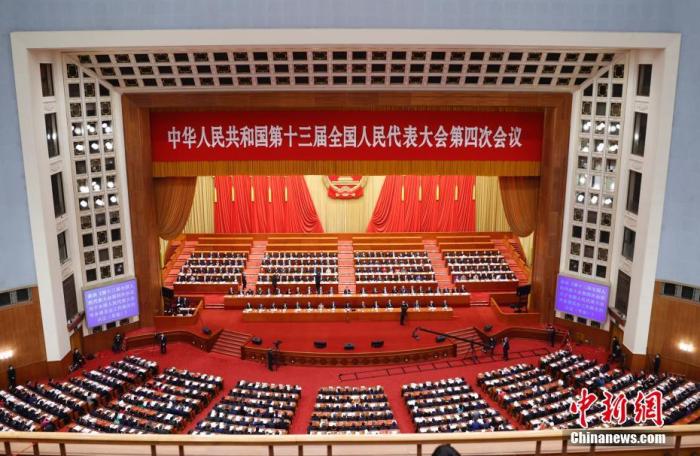(Observation of the two sessions) At the conclusion of the two sessions, how does the permanent organ of the National People's Congress "convene" on a daily basis?
China News Service, Beijing, March 11 (Reporter Xing Chong and Liang Xiaohui) The 2021 National People's Congress closed on the 11th, but as the permanent organ of the National People's Congress, another year of routine work of the Standing Committee of the National People's Congress has just started.
On March 11, the fourth session of the 13th National People's Congress held a closing meeting in the Great Hall of the People in Beijing.
Photo by China News Agency reporter Du Yang
Judging from the Constitution, the Standing Committee of the National People's Congress has been given 22 basic functions and powers, which generally include four aspects: legislation, supervision, decisions on major issues, and personnel appointments and removals.
The effective exercise of these powers must be achieved through the convening of the Standing Committee of the National People's Congress.
According to the rules of procedure of the Standing Committee of the National People's Congress, meetings of the Standing Committee of the National People's Congress are generally held every two months. When there are special needs, they can convene temporary meetings.
Following this, in practice, the Standing Committee of the National People's Congress has formed a working practice of meeting in the second half of the "bimonthly" period, which usually holds 6 meetings a year.
However, due to work needs, since the 13th National People's Congress, temporary additional meetings of the Standing Committee have gradually developed into a "normal".
For example, last year, the Standing Committee of the National People's Congress held three additional meetings to promptly deal with urgent and important issues related to the epidemic and Hong Kong-related legislation.
Since the current session, the number of temporary meetings of the Standing Committee has reached 6 times.
Many agendas, high quality, and more compactness have become the perception of "additional" meetings.
However, from a procedural point of view, the provisional addition is the same as the scheduled meeting of the Standing Committee, which requires strict statutory procedures.
According to the rules of procedure of the Standing Committee of the National People’s Congress, the Standing Committee meeting is convened and presided over by the chairman, and the chairman’s meeting draws up a draft of the Standing Committee meeting agenda and submits it to the plenary meeting of the Standing Committee for decision. The members of the Standing Committee shall be notified of the main matters discussed, and the temporary convened meetings may be notified temporarily.
In addition to members of the Standing Committee and non-voting delegates from various departments, those participating in the meetings of the Standing Committee will also invite "relevant" NPC deputies to attend the meeting as a non-voting representative of the "full-process democracy" of the Standing Committee meetings.
For example, when the Standing Committee meeting deliberated the draft of the Hong Kong National Security Law in June last year, 10 deputies to the Hong Kong People's Congress attended the meeting and gave their opinions.
Since the Third Session of the 13th National People's Congress, as many as 175 delegates have attended.
In addition to attending non-voting delegates, these NPC deputies will usually participate in a special forum where they can "face-to-face" communicate with the chairman of the committee to speak freely and make suggestions on the work of the NPC.
This shows that at the closing of the National People's Congress, the NPC deputies can still bring the voice of the people to the National Assembly Hall in real time.
And the voice of the National Assembly Hall can now be better spread among the people.
Since the 13th National People's Congress, the Standing Committee has carried out a series of innovative and institutional approaches to information disclosure.
For example, the Legislative Work Committee, the legislative work body of the Standing Committee of the National People's Congress, has established a spokesperson mechanism. By holding a press conference before the meeting of the Standing Committee, answering questions on legislative issues of concern to the outside world in advance, and actively releasing information.
When the Standing Committee meeting is not in session, the spokesperson of the Legal Work Committee often speaks on hot issues of legislation and becomes a window for the outside world to understand Chinese legislation.
This window allows the public to better understand how the Standing Committee of the National People's Congress meets, how to discuss matters, and how to legislate.
People know more about the sensible progress of China's democratic politics.
(Finish)

